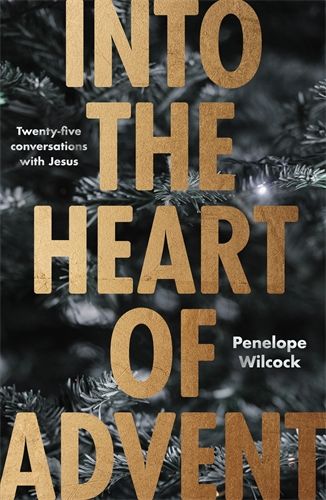Meeting the real, living Jesus this Advent

For many people, 2020 will be remembered as a year like no other. Penelope Wilcock is hoping that her new book, 'Into the Heart of Advent', will speak into the challenges of this year by bringing people closer to Jesus.
Her new book, published by SPCK, offers a journey through Advent through a series of imagined conversations and personal encounters with Jesus.
Whether in the shop or by the fire drinking tea, Jesus is right there with her, human and yet divine.
Penelope speaks to Christian Today about what the heart of Advent means to her and the personal encounter she hopes people will have with Jesus through her book.
CT: This year has been difficult for so many people. Do you think this Advent and the 'waiting' of the season has more meaning than usual?
Penelope: Yes, I think we are in a momentous time, passing through a portal of sorts, experiencing the birth pangs of the future. When we look back on 2020 in years to come, I believe we will identify it as a turning point. Advent is a time of deepening darkness, watching and waiting for light, examining our hearts and making ourselves ready for the coming King. Then, when the year turns at Yule, at the solstice, and the infant light is born, life picks up and begins again.
This year we have experienced an immense intensity of many kinds of darkness — loneliness, isolation, fear, bereavement, hardship and suffering because of the pandemic; political corruption and confusion; fear and dread to do with economic hardship as we descend into recession and face Brexit with all that will bring.
It's also been a year when darkness has been exposed — consider the murder of George Floyd and the extent of the systemic racism that has come inescapably to our attention; or consider the depth and implication of the climate change challenges we face; or the entirely unnecessary misery of refugees.

As we travel through Advent this year, we would be unusually out of touch if we failed to notice and feel the deepening and surrounding darkness of our times. But where the darkness is deepest, the light shines forth most brightly.
As we come to this year's Yule, at the time of the infant light when we celebrate the incarnation of Emmanuel, God with us, it is of particular importance that we have readied our hearts to receive the light. I believe it will be bright, and transformative, this year.
CT: Turning to your book, what is the 'heart of Advent' for you?
Penelope: I love Advent. I am not very interested in presents or parties, and I like to keep things simple, so it isn't that I look forward to a mad social whirl (just as well, this time round) or a shopping spree! But I love the frosty air, the stars, the fire on the hearth. I love candlelight and the traditional songs.
Every year at this time, there's an indefinable stirring of excitement, that feels to me like anticipation and hope. As we travel again to Bethlehem to bear witness to the coming of love to Earth, there is a joy so close I feel I could reach out and touch it.
CT: The conversations between yourself and Jesus in your book are so personal and so human. Have you always had this kind of close, personable relationship with Jesus? How do you nurture that relationship?
Penelope: There's an old book you may have come across, entitled Practising the Presence of God, by a monk called Brother Lawrence who worked in the kitchen at his monastery. He talks about not keeping God at arm's length, but consciously living every day in his companionship. This is similar to what St Teresa of Avila taught the nuns in her convent — that in their prayer they could just be with Jesus, and talk to him as their dearest friend. I haven't got any techniques for this, really. It's just that he is here, and so am I, and I try to pay attention to that. It has been so for nearly fifty years, since I was fifteen.
CT: What advice would you give to anyone struggling to have this kind of personal relationship with Him right now?
Penelope: I wouldn't want to belittle anybody's difficulties, but I think maybe struggle wouldn't help it along. There are only two things I can think of to suggest. One is that it's necessary to make some space in your life. The relationship with Jesus takes place on a very subtle level — it's a mystery — so it is vulnerable to being crowded out by a packed schedule or a morass of possessions or a sliding scree of commitments — anything that takes up your time and attention.
To become 'spacious', a person has to start practising simplicity, and that means creating a habit of relinquishment. In the space you make, Jesus can appear.
And then the second thing is to ask — quietly and seriously, meaning it with all your heart - is to invite him to walk with you, talk with you, stay with you.

CT: In your book, Jesus explains that the meaning of Christmas to Him is "saying 'yes'". At this challenging time, when many of us may feel tempted to say 'no' and pull the duvet back over our heads, what do you think we can learn from Jesus' example and the example of those in the Christmas story of saying 'yes'?
Penelope: This has been a bit of a bumper book year for me. In the spring SPCK published my book Equality is Biblical, and in the summer this Advent book came out, and then during the autumn I self-published a book called Relinquishment, subtitled Making space for what really matters. I mention this because a central proposition of my book Relinquishment is that saying "no" is integral to saying "yes". Our path doesn't augment, it divides; we have to make choices. For instance, saying "yes" to writing three books in one year meant saying "no" to doing almost anything else.
The example of Jesus in coming to walk with us and share our ordinary life, is surely that it took great courage. In saying "yes" to vulnerability, he said "no" to insularity.
The reality we had to offer him took everything he had. As we creep under the duvet and wish the world and all its problems would go away, perhaps in that solitude, quietness and darkness of that place, we might like to consider that this was the choice Jesus faced too.
And that makes everything easier, because he did make the choice to step forward and enter our world, to be there in the middle of the problems. So he is already there, in that place we fear to go. If we are brave enough to creep out, and join in step by step, we will find ourselves walking beside him.
CT: Your book is a work of fiction but it's also grounded in facts about Christmas. In researching your book, did any of the facts you discovered surprise you or teach you anything unexpected about this most familiar of seasons?
Penelope: Much of our focus in the Advent season follows a hallowed and familiar path of tradition. It mostly tells the story one more time, rather than offering innovation. There is revelation in that, but more often as an awakening of the heart to what has always been there, than as embracing a new idea. But one thing that did come new to me in writing this book — I grasped for the first time how the shepherds knew where to go when the angels told them of the birth of Jesus. I realised that for the Bethlehem shepherds, the angels' news actually incorporated instructions for finding the baby. And that brought the little frisson of delight at the heart of that moment when you suddenly see.
CT: You write in the introduction that in your books, you try to write the reader's story. What does that look like in the context of this book? What do you want the reader to take away?
Penelope: If someone comes to my book seeing it as hospitality — my invitation to come in to this life I share with Jesus, and sit awhile with us, share a cup of tea, curl up beside the fire — then I hope the reader will feel a sense of encounter. What I have written here is not cerebral constructs for people to argue about, or pass on so that they can sound clever. There is nothing like that here. It's just a conversation and a meeting. If the reader closes the book feeling they have glimpsed and touched something living and breathing, something real, and that Jesus was there with them, then I will have succeeded.











